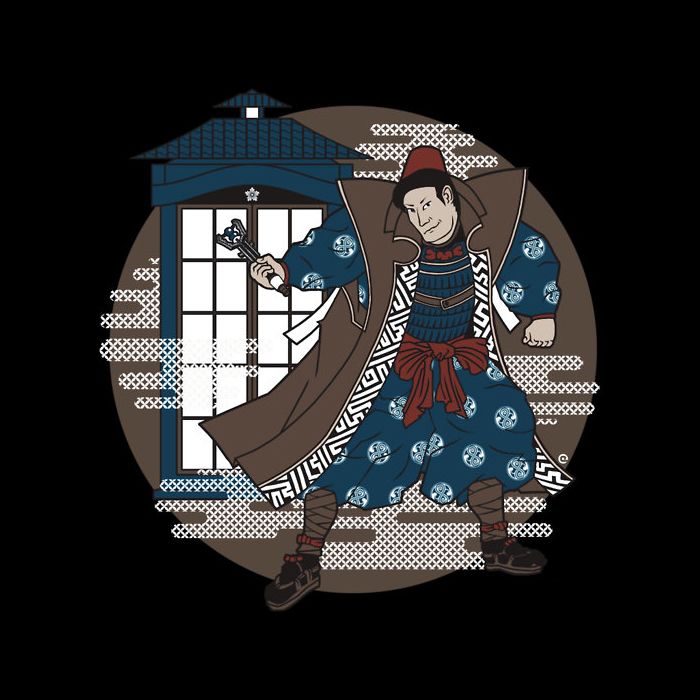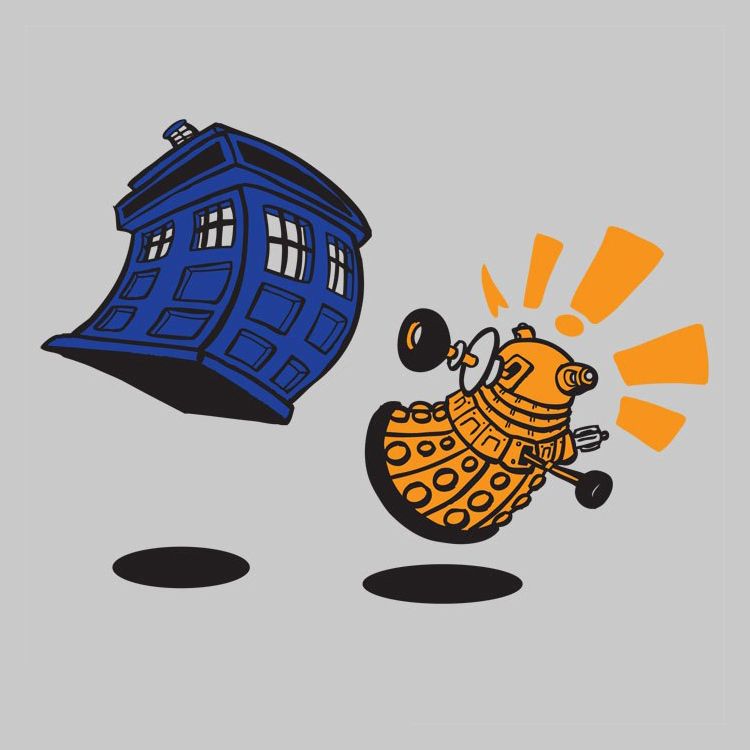
"Doctor Who 50th Anniversary" (t-shirt) by David Johnston

"Sensei Who" (t-shirt) by Eozen

"Chibi TARDIS and Dalek" (t-shirt) by Jeff Pina
I have extremely mixed feelings on Steven Moffat's entire tenure as executive producer. I think that, for all his failings, Russell T. Davies genuinely loved and just GOT Doctor Who. He understood what made it great. He had a vision of the show which dragged it into the 21st century while still respecting and admiring both it and the fans, new and old. Sure, he could be overly sentimental, sometimes to the point of being ridiculous, and he had a tendency to rely a little too much on the "power of love" trope, even when it didn't really fit, but he brought a pathos and an excitement and a sense of wonder to Doctor Who - his highs were as dramatic as his lows. I still get goosebumps when I think of the 9th Doctor saying, "Everybody lives, Rose! Just this once, everybody lives!" Or how everyone from The Master to Rassilon to Sarah Jane were re-introduced to the show. I was moved to tears when David Tennant ended his run and said goodbye. RTD imbued his Doctors with a sense of empathy and really knew how to get us to connect with them.
We all KNOW that the Doctor is 900-some years old and has an incredible mind and is a savior (and sometimes destroyer) of worlds. What makes him appealing is his sense of whimsy and optimism and desire to help wherever he can. To do this, he has to care about people on some level - not just the people he hangs around with, but everyone. He might be enamored of his own cleverness sometimes, he might even be smug and condescending on occasion, but at heart he really does care. RTD did a great job of getting this across with the Doctor constantly saving the earth from one threat or another, whether it was Daleks or Cybermen or Adipose. The threats that the 9th and 10th Doctors faced were threats to humanity, and these Doctors' stories were epic and glorious and writ large.
Moffat's 11th Doctor has shown himself to be a beast of a different stripe. While I like Matt Smith and I think he's an excellent Doctor, I don't particularly like the way Moffat has told stories about him. How many world-threatening enemies has he faced? How many times has he saved humanity? When I think about even the best episodes of Moffat's run as executive producer on the show - Vincent and The Doctor, The Doctor's Wife, The Girl Who Waited, Asylum of the Daleks - the challenge that the Doctor is faced with is never a huge, overwhelming external threat, but rather something small and personal, targeting himself and his friends.
And that works, for a while. But as time goes by, this limited focus - rescuing Amy and Rory, rescuing River, rescuing himself, and maybe saving a few incidentals along the way - serves to diminish the Doctor. He's no longer a larger than life figure, working against time and pressure and his own physical and mental limitations to save the world, time and again; he becomes petty, more flawed and easier to criticize. David Tennant's Doctor got a free pass because we saw him agonizing over making the hard choices to save - in many cases - billions. Matt Smith's Doctor, by comparison, has at times been willing to sacrifice himself for Amy or Clara. On the surface, that's good, right? But if you know what the Doctor knows - that he's the only thing standing between trillions of lives and unknown forces who want to destroy them - it comes off as supremely selfish, small-minded, and a phenomenal waste.
Moffat has clearly taken a different approach to Doctor Who. Before Season Five started, he talked a big game about how he wanted to take things in a more 'fairy-tale' direction (which you can clearly see in the way Amy is handled in The Eleventh Hour). He's made all sorts of promises and claims along the way - setting up big mysteries and then, when his hand has been forced, resolving them in a graceless, hamfisted, and nonsensical manner; he's relied on exposition when those things should be integrated into the story; his grasp on time travel, paradoxes and just basic storytelling sense is practically non-existent. RTD may have used "power of love" as a resolution more often than he should have, but at least his storylines worked. Moffat's big set pieces - his season finales mainly - have been obfuscatingly and unnecessarily complex, seemingly to hide the fact that at their root, they don't make sense.
There haven't been many moments in Moffat's run that hit me on an emotional level and gave me chills. No "Everybody lives" moments. Moffat's Doctor is more detached and aloof, and emotional scenes have been wholly avoided and glossed over (the one exception being the end of Vincent and the Doctor, which stands, I believe, as the best episode Moffat has given us to date). This in itself isn't a terrible decision, but like much of Moffat's decisions, it feels like he didn't really have a backup plan. He didn't say, "I want to give fans a more cerebral, intellectually-satisfying Doctor" - instead, it feels like he said, "I don't like that mushy stuff. Let's take it out." Moffat talks a big game about where he's going to take Doctor Who, how everyone will be blown away when he reveals his end-game on various storyline threads that have been brought up, but at this point we've been burned enough times that I, for one, don't really believe him anymore. I mean, c'mon - the whole "Doctor is tiny and inside a Doctor-sized robot replica of the Doctor, and THAT'S who actually got shot by River so time didn't derail, because it still had to happen, just not the way you thought it did" was so much of a storytelling fumble, it felt insulting. And don't get me started on the contradictory, self-important mess of the Pandorica.
So all of this is to say that I get a certain vibe from Moffat that I never got from RTD - a cynical, unemotional, grasping-at-straws vibe. On one hand, it seems like Moffat is not up to the task, like he's bitten off more than he can chew; on the other, though, he has such a bombastic, used-car-salesman arrogance, like he's over-promising on something that could in no way possibly live up to the expectations, and he keeps doing it over and over again, even when we've caught him in this lie more than once. I was enthusiastically open-minded when he came on board, and I even gave him the benefit of the doubt during his first season, when the cracks (no pun intended) were already starting to show. I don't think he likes or respects fans of the show so much as he wants to prove something to them, and he's starting to come across as the kind of guy who loudly asserts that he refuses to compromise his vision and ideals, that he's going to do Doctor Who HIS way, dammit! No one is going to tell HIM how to do Doctor Who! While all the while, everyone is kind of exchanging nervous glances because no one said anything.
All of which brings us to the season 7 finale. Despite everything I just said, I really do like Matt Smith, and he brings enough charisma and spark to his Doctor that he is almost single-handedly making the show work. And I really liked The Name of the Doctor. I liked it a lot more than I thought I would. Sure, it's not perfect, but for once, Moffat almost delivers on his promises - I mean, he's a hair's-breadth away from pulling it off, as opposed to the miles off he's been in the past.
I don't want to get into too many spoilers, but the big mystery of Clara Oswin Oswald, the Impossible Girl, is finally answered, and as long as you don't look at it too closely, it kind of works. Basically, Clara fragments herself in time to save the Doctor, and thus appears regularly along his timeline at key moments to push him in one direction or another (and to undo damage wrought by the Great Intelligence, who had moments earlier entered the Doctor's timestream to destroy him.) It's a big, dramatic moment, and pulled off with enough flair and bravado that it almost makes up for the fact that clearly Moffat had no idea where he was going with this Impossible Girl thing until the 11th (heh) hour.
For example, why did all of these past Claras know that they had to correct the course of the Doctor's timestream, seek him out, direct him and protect him like a guardian angel, but also had no idea that there were other Claras out there doing the same thing? Based on the actions and attitude of modern-day Clara (Clara Prime, if you will), it's not like she was born with some innate knowledge of the Doctor or a drive to locate him, and all three Claras that we've met have encountered the Doctor by pure, random chance. On top of that, why have we never seen her before? She's correcting the course of every Doctor's timeline, not just the 11th, and while these encounters may have been so minor that the Doctor and his companions never put two and two together (unlikely, but let's go with that), it seems like a guardian angel protecting him from the very start would have come up on the radars of readers and viewers.
But let's assume that through some timey-wimey hand-wavery, the Guardian Angel Claras only existed in the Doctor's timestream from the moment that she actually entered the timestream. We see her meeting the 1st Doctor and advising him to take THIS TARDIS instead of THAT one. This scene bugs me for a couple of reasons: one, she's a human on Gallifrey, and unless she was only there for a brief time, someone should have noticed this; two, while maybe she somehow recognized her TARDIS in an un-chameleon-circuited state and that was the basis of the recommendation, who made her an expert on the matter? And finally, three, was that the entire purpose of that Clara's role at that moment? To say, "Hey, dude, take this one, it's better"? I hope not, because while the Doctor acquiring the TARDIS is a pretty important moment, it isn't like she then joined him on his adventures.
Anyway, putting all of that aside, the episode had tons of Strax, which is always a big plus for me, and actually made marginally more sense than some of Moffat's other finales. Plus, the big cliff-hanger was, for me, almost as exciting as finding out Professor Yana was The Master at the end of Season 3. Can we all agree that John Hurt is The Valeyard? I mean, that seems pretty obvious, right?
I say almost as exciting, because the whole thing was handled with the muddled bombast I've come to expect from Moffat. It's made pretty clear that this mysterious figure is NOT the Doctor, and does not deserve to carry the name. And then, in a jarringly inappropriate freeze-frame, a caption pops up introducing "John Hurt as... The Doctor". It was unsubtle and heavy-handed and ruined what should have been a great moment - possibly the greatest moment of Moffat's tenure to date. It was also unnecessarily contradictory in its effort to be cryptic. Just tell us it's The Valeyard and let us chew that over for the next eight months. You even set this up by mentioning The Valeyard by name earlier in the episode. Learn to bring a story full circle, man!
If it turns out NOT to be The Valeyard - and because this is Moffat we're talking about, there's a possibility that it won't be, now that I think about it - I'm going to be pissed off. I'm sick and tired of his whole bait-and-switch routine, and his refusal to make this HIS Doctor Who to the exclusion of everything that came before it. If, on the other hand, we're leading into a season where The Valeyard is the ongoing threat, this makes both perfect sense and will retroactively excuse the 11th Doctor's increasingly self-obsessed tendencies. The Valeyard is the ultimate culmination of that, a Doctor who puts his own needs and desires and impulses ahead of anything or anyone else, a Doctor who will mercy-kill for the sake of doing what he believes is right.
So bring on an introspective exploration of what being the Doctor really means! Bring on The Valeyard! Dig into the history of Doctor Who, where he came from, how he dealt with The Valeyard previously, and prove that you really understand and care about Doctor Who! You've almost lost me, Moffat - I don't like what you've done with the show, but I'm still willing to give you a chance. You don't have to be Russell T. Davies, you just have to make some goddamn sense.

No comments:
Post a Comment